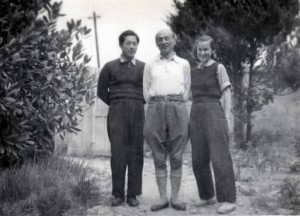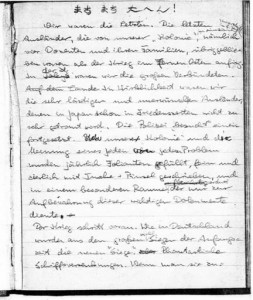German Jewish woman describes atomic bombing as “like hell itself” in written account
Aug. 4, 2016
by Masami Nishimoto, Senior Staff Writer
A German Jewish woman and her uncle, who lived in the city of Yamaguchi during World War II, were exposed to the atomic bomb’s radiation after entering Hiroshima in the wake of the attack on the day following the end of the war. In her account, she wrote about her experience of the “city of death” and the people there on August 16, 1945. An interview with her daughter, who lives in the United States, revealed details of the harsh lives of the Jewish people who were driven from their homeland and then encountered the atomic bombing.
Wiltrud Potter (1918-2010) wrote her account four years after the atomic bombing, and her eldest daughter, Kerstine Potter, 69, donated it to the Hiroshima National Peace Memorial Hall for the Atomic Bomb Victims, located in the Peace Memorial Park in Naka Ward. Wiltrud Potter’s uncle was Werner Preibisch (1896-September 1945), a German teacher at Yamaguchi Higher School (now Yamaguchi University).
Transferred from the city of Yamaguchi
In her 26-page account written in German, Ms. Potter began with the days when she and her uncle were under surveillance by the police after war broke out between Japan and the United States though Japan had made an alliance with Germany. “We were ordered to transfer to a mountain village in Okayama on August 6, 1945,” she wrote. Three days later, she learned that the city of Hiroshima had been annihilated on August 6 then listened, with neighbors, to the radio broadcast of Emperor Hirohito announcing Japan’s surrender on August 15. Still, the order was not rescinded and Ms. Potter and Mr. Preibisch remained under the watchful eye of authorities when they left Yamaguchi.
They arrived at Hiroshima Station around 7 a.m. on August 16. “People were so horror-struck that they couldn’t even feel sad,” she wrote. “Some were sitting on the ground, nearly naked.”
They went to and from what apparently was Ujina Port, and were detained there for about 12 hours. Ms. Potter described the sights of the city as “like hell itself” and noted what she heard, that “Everyone who experienced the atomic bombing will die sooner or later.”
Her account ends with the words: “Hiroshima, the A-bombed city, is now burned into my mind. How can I be released from those terrible sights?”
Rarely mentioned her A-bomb experience
At her uncle’s invitation, Wiltrud arrived in Yamaguchi from Hamburg, Germany in 1937. From 1936 to 1945, Werner Preibisch was listed as “a hired foreign teacher, German language” at Yamaguchi High School. After the Nazis came to power in 1933, Mr. Preibisch moved to Japan from Greece, where he had been a teacher.
On September 11, 1945, Werner Preibisch committed suicide in the city of Yamaguchi. There, on the grounds of Choju Temple, is his gravestone, inscribed in both Japanese and German. The gravestone was arranged by Wiltrud in 1952, and she regularly made offerings to it while she was alive.
Wiltrud then met and married George Potter, who was the same age as Wiltrud. After working as a teacher at Fukuoka Higher School (now Kyushu University), Mr. Potter came again to Japan to serve as a soldier with the U.S. occupation. In 1949, Wiltrud moved to the eastern part of the United States with her husband and eldest daughter, who was born in Tokyo. She had a good command of Japanese.
Kerstine, the eldest daughter, decided to make her mother’s account public after she visited Hiroshima this past April.
She said, “My mother rarely mentioned her experience of Hiroshima. She thought my sister had a disability because of her own exposure to the A-bomb radiation. She understood the horror of nuclear weapons and was a pacifist until the day she died.” She added, “I think her uncle chose to commit suicide because the Germany and the fiancee he loved had been stolen away by the Nazis and he saw the tragic situation caused by human beings in Hiroshima.”
Four clergymen who came to Japan from the German order of the Society of Jesus experienced the atomic bombing at the Noboricho Church located in Naka Ward. This is the first known A-bomb experience of a German national who lived in Yamaguchi.
(Originally published on August 4, 2016)
A German Jewish woman and her uncle, who lived in the city of Yamaguchi during World War II, were exposed to the atomic bomb’s radiation after entering Hiroshima in the wake of the attack on the day following the end of the war. In her account, she wrote about her experience of the “city of death” and the people there on August 16, 1945. An interview with her daughter, who lives in the United States, revealed details of the harsh lives of the Jewish people who were driven from their homeland and then encountered the atomic bombing.
Wiltrud Potter (1918-2010) wrote her account four years after the atomic bombing, and her eldest daughter, Kerstine Potter, 69, donated it to the Hiroshima National Peace Memorial Hall for the Atomic Bomb Victims, located in the Peace Memorial Park in Naka Ward. Wiltrud Potter’s uncle was Werner Preibisch (1896-September 1945), a German teacher at Yamaguchi Higher School (now Yamaguchi University).
Transferred from the city of Yamaguchi
In her 26-page account written in German, Ms. Potter began with the days when she and her uncle were under surveillance by the police after war broke out between Japan and the United States though Japan had made an alliance with Germany. “We were ordered to transfer to a mountain village in Okayama on August 6, 1945,” she wrote. Three days later, she learned that the city of Hiroshima had been annihilated on August 6 then listened, with neighbors, to the radio broadcast of Emperor Hirohito announcing Japan’s surrender on August 15. Still, the order was not rescinded and Ms. Potter and Mr. Preibisch remained under the watchful eye of authorities when they left Yamaguchi.
They arrived at Hiroshima Station around 7 a.m. on August 16. “People were so horror-struck that they couldn’t even feel sad,” she wrote. “Some were sitting on the ground, nearly naked.”
They went to and from what apparently was Ujina Port, and were detained there for about 12 hours. Ms. Potter described the sights of the city as “like hell itself” and noted what she heard, that “Everyone who experienced the atomic bombing will die sooner or later.”
Her account ends with the words: “Hiroshima, the A-bombed city, is now burned into my mind. How can I be released from those terrible sights?”
Rarely mentioned her A-bomb experience
At her uncle’s invitation, Wiltrud arrived in Yamaguchi from Hamburg, Germany in 1937. From 1936 to 1945, Werner Preibisch was listed as “a hired foreign teacher, German language” at Yamaguchi High School. After the Nazis came to power in 1933, Mr. Preibisch moved to Japan from Greece, where he had been a teacher.
On September 11, 1945, Werner Preibisch committed suicide in the city of Yamaguchi. There, on the grounds of Choju Temple, is his gravestone, inscribed in both Japanese and German. The gravestone was arranged by Wiltrud in 1952, and she regularly made offerings to it while she was alive.
Wiltrud then met and married George Potter, who was the same age as Wiltrud. After working as a teacher at Fukuoka Higher School (now Kyushu University), Mr. Potter came again to Japan to serve as a soldier with the U.S. occupation. In 1949, Wiltrud moved to the eastern part of the United States with her husband and eldest daughter, who was born in Tokyo. She had a good command of Japanese.
Kerstine, the eldest daughter, decided to make her mother’s account public after she visited Hiroshima this past April.
She said, “My mother rarely mentioned her experience of Hiroshima. She thought my sister had a disability because of her own exposure to the A-bomb radiation. She understood the horror of nuclear weapons and was a pacifist until the day she died.” She added, “I think her uncle chose to commit suicide because the Germany and the fiancee he loved had been stolen away by the Nazis and he saw the tragic situation caused by human beings in Hiroshima.”
Four clergymen who came to Japan from the German order of the Society of Jesus experienced the atomic bombing at the Noboricho Church located in Naka Ward. This is the first known A-bomb experience of a German national who lived in Yamaguchi.
(Originally published on August 4, 2016)









